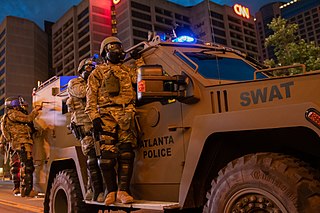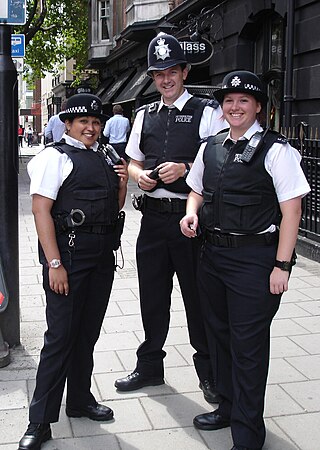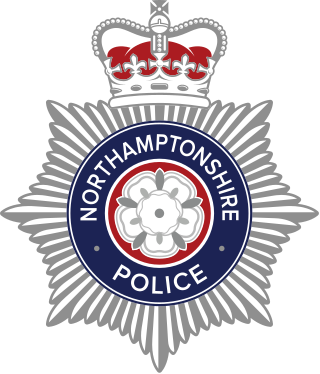
The police are a constituted body of persons empowered by a state, with the aim to enforce the law, to ensure the safety, health, and possessions of citizens, and to prevent crime and civil disorder. Their lawful powers include arrest and the use of force legitimized by the state via the monopoly on violence. The term is most commonly associated with the police forces of a sovereign state that are authorized to exercise the police power of that state within a defined legal or territorial area of responsibility. Police forces are often defined as being separate from the military and other organizations involved in the defense of the state against foreign aggressors; however, gendarmerie are military units charged with civil policing. Police forces are usually public sector services, funded through taxes.

The Fourth Amendment to the United States Constitution is part of the Bill of Rights. It prohibits unreasonable searches and seizures and sets requirements for issuing warrants: warrants must be issued by a judge or magistrate, justified by probable cause, supported by oath or affirmation, and must particularly describe the place to be searched and the persons or things to be seized.
Military justice is the body of laws and procedures governing members of the armed forces. Many nation-states have separate and distinct bodies of law that govern the conduct of members of their armed forces. Some states use special judicial and other arrangements to enforce those laws, while others use civilian judicial systems. Legal issues unique to military justice include the preservation of good order and discipline, the legality of orders, and appropriate conduct for members of the military. Some states enable their military justice systems to deal with civil offenses committed by their armed forces in some circumstances.

Law enforcement in China consists of an extensive public security system and a variety of enforcement procedures used to maintain order in the country. Along with the courts and procuratorates, the country's judicial and public security agencies include the Ministry of Public Security (MPS) and the Ministry of State Security (MSS), with their descending hierarchy of departments, bureaus, subbureaus, and stations.

A curfew is an order that imposes certain regulations during specified hours. Typically, curfews order all people affected by them to remain indoors during the evening and nighttime hours. Such an order is most often issued by public authorities, but may also be given by the owner of a house to those living in the household. For instance, children are often given curfews by their parents, and an au pair is traditionally given a curfew by which time he or she must return to his or her host family's home. Some jurisdictions have juvenile curfews which affect all persons under a certain age not accompanied by an adult or engaged in certain approved activities.

Law enforcement in the United Kingdom is organised separately in each of the legal systems of the United Kingdom: England and Wales, Scotland, and Northern Ireland. Most law enforcement duties are carried out by those who hold the office of police constable of a territorial police force.
Terry v. Ohio, 392 U.S. 1 (1968), was a landmark U.S. Supreme Court decision in which the court ruled that it is constitutional for American police to "stop and frisk" a person they reasonably suspect to be armed and involved in a crime. Specifically, the decision held that a police officer does not violate the Fourth Amendment to the U.S. Constitution's prohibition on unreasonable searches and seizures when questioning someone even though the officer lacks probable cause to arrest the person, so long as the police officer has a reasonable suspicion that the person has committed, is committing, or is about to commit a crime. The court also ruled that the police officer may perform a quick surface search of the person's outer clothing for weapons if they have reasonable suspicion that the person stopped is "armed and presently dangerous." This reasonable suspicion must be based on "specific and articulable facts," and not merely upon an officer's hunch.
Special police usually describes a police force or unit within a police force whose duties and responsibilities are significantly different from other forces in the same country or from other police in the same force, although there is no consistent international definition. A special constable, in most cases, is not a member of a special police force (SPF); in countries in the Commonwealth of Nations and often elsewhere, a special constable is a voluntary or part-time member of a national or local police force or a person involved in law enforcement who is not a police officer but has some of the powers of a police officer.

Law enforcement in Australia is one of the three major components of the country's justice system, along with courts and corrections. Law enforcement officers are employed by all three levels of government – federal, state/territory, and local.
In criminal law, self-incrimination is the act of exposing oneself generally, by making a statement, "to an accusation or charge of crime; to involve oneself or another [person] in a criminal prosecution or the danger thereof". Self-incrimination can occur either directly or indirectly: directly, by means of interrogation where information of a self-incriminatory nature is disclosed; or indirectly, when information of a self-incriminatory nature is disclosed voluntarily without pressure from another person.

Northamptonshire Police is the territorial police force responsible for policing the county of Northamptonshire in the East Midlands of England, in the United Kingdom.

The Federal Criminal Police Office of Germany is the federal investigative police agency of Germany, directly subordinated to the Federal Ministry of the Interior. It is headquartered in Wiesbaden, Hesse, and maintains major branch offices in Berlin and Meckenheim near Bonn. It has been headed by Holger Münch since December 2014.

"Stop and identify" statutes are laws in several U.S. states that authorize police to lawfully order people whom they reasonably suspect of committing a crime to state their name. If there is not reasonable suspicion that a person has committed a crime, is committing a crime, or is about to commit a crime, the person is not required to identify himself or herself, even in these states.

As of 2020, more than 800,000 sworn law enforcement officers have been serving in the United States. About 137,000 of those officers work for federal law enforcement agencies.

Law enforcement in Ethiopia is dealt with by the Ethiopian Federal Police at federal level and by regional police commissions in the Regions of Ethiopia. The Ethiopian Federal Police (EFP) was established in 1995 to serve the public, to ensure the observation of human and democratic rights and to maintain the safety and welfare of the public. Its stated duties are the enforcement of laws and safeguarding constitutional guarantees, the prevention, detection and investigation of crime, the coordination of national state police commissions and development of national policing standards. The EFP also has to provide operational support to regional police commissions.
However, local militias also provide local security largely independent of the police and the Ethiopian military. Corruption is a perennial problem, particularly among traffic police who solicited bribes.
The U.S. Department of State states that its contacts within the Ethiopian government report that the findings of investigations into abuses by local security forces, such as arbitrary detentions and beatings of civilians, are rarely made public. However, the Ethiopian government continued its efforts to train police and army recruits in human rights. During 2008 the government was seeking assistance from the International Committee of the Red Cross, the local non-governmental organization Prison Fellowship Ethiopia (JFA-PFE), and the Ethiopian Human Rights Commission to improve and professionalize its human rights training and curriculum. The JFA-PFE provided human rights training for police commissioners and members of the militia in 2008.

In many countries, particularly those with a federal system of government, there may be several law enforcement agencies, police or police-like organizations, each serving different levels of government and enforcing different subsets of the applicable law.
The law of Panama is based on civil law with influences from Spanish legal tradition and Roman laws. For the first several years of its existence Panamanian law depended upon the legal code inherited from Colombia. The first Panamanian codes, promulgated in 1917, were patterned upon those of Colombia and other Latin American states that had earlier broken away from the Spanish Empire. Therefore, Panama's legal heritage incorporated elements from Spain and its colonies.

Crime in Panama is investigated by the Panamanian police.














